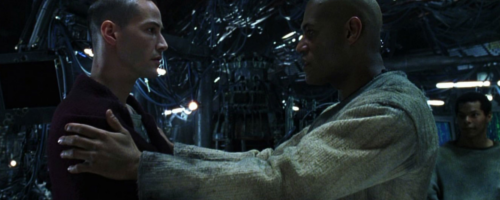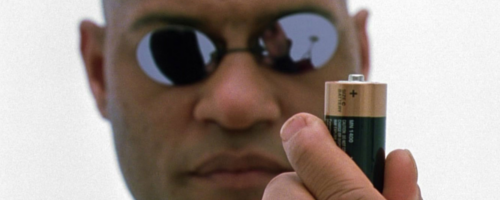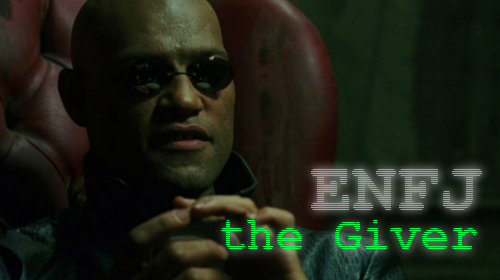ENFJ, the Giver, the Mentor, the Believer
Morpheus joins a long line of archetypal ENFJ mentor characters in the movies (like Glinda, or Obi-Wan), showing up in the movies to push our hero to realize his or her potential. Just last week, my church lost someone who I’m pretty sure was an ENFJ, judging by the way his positive impact spread to everybody around him, through others, and into people who didn’t even know him firsthand, like me. So as I write this profile, I’m thinking deeply about how the goodness we pursue can affect others without us even knowing it—whether or not we’re trying to save the world from robots.
Dominant Function: Fe/Extraverted Feeling, “Relate to the Experience”
 Morpheus presents an imposing presence, but he’s not aloof and detached like the other characters in The Matrix. He speaks warmly and can’t hide his enthusiasm when he finally meets Neo. His gestures are open and expressive, and he commands the room when he speaks.
Morpheus presents an imposing presence, but he’s not aloof and detached like the other characters in The Matrix. He speaks warmly and can’t hide his enthusiasm when he finally meets Neo. His gestures are open and expressive, and he commands the room when he speaks.
Morpheus has an emotional bond with his crew members, and inspires them to follow him. When he introduces the crew to Neo, he lays his hands on their shoulders as he names them off (even Cypher!). Tank says, in his mini-eulogy when they think they’re about to lose Morpheus, that Morpheus was a father to them. When Neo starts suiting up for the rescue mission, Trinity tells Neo that Morpheus means more to her than he does to Neo, so she’s going to come along.
Morpheus genuinely cares for Neo both as a person and as the iconic One. He sounds pained as he explains to the newly awakened Neo that Neo has never used his muscles or his eyes before. When Neo “pops,” puking in disorientation at the truth of the Matrix, Morpheus feels regret and apologizes for breaking it to him when he wasn’t ready. Even when he’s beating the crap out of Neo in the dojo program, Morpheus encourages Neo and patiently guides him.
Auxiliary Function: Ni/Introverted Intuition, “Anticipate the Experience”
 Morpheus decides before anyone else does that Neo is The One. He sees clues or connections that no one else does, puts them together to form his conclusion, and believes without question. Paired with his Fe-dom, this means Morpheus is willing to sacrifice himself to save Neo, which the Oracle (another Ni user) warns Neo about. He believes in Neo blindly, she says. Continue reading
Morpheus decides before anyone else does that Neo is The One. He sees clues or connections that no one else does, puts them together to form his conclusion, and believes without question. Paired with his Fe-dom, this means Morpheus is willing to sacrifice himself to save Neo, which the Oracle (another Ni user) warns Neo about. He believes in Neo blindly, she says. Continue reading


